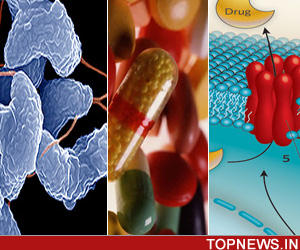Anti-infectives seep into world’s waterways, endangers aquatic microbiota
 Washington, June 10 : An investigation has revealed that antibiotics, antimicrobials and antifungals are seeping into the waterways of North America, Europe and East Asia, which might have detrimental effects on aquatic microbiota.
Washington, June 10 : An investigation has revealed that antibiotics, antimicrobials and antifungals are seeping into the waterways of North America, Europe and East Asia, which might have detrimental effects on aquatic microbiota.
Authored by Universite de Montreal and Environment Canada researchers, the investigation found that consumption of anti-infectives for human and agriculture use contributes to their release into the environment and even into drinking water.
"Anti-infectives are constantly discharged, at trace levels, in natural waters near urban centres and agricultural areas," said senior author Sebastien Sauve, a Universite de Montreal professor of environmental analytical chemistry.
"Their potential contribution to the spread of anti-infective resistance in bacteria and other effects on aquatic biota is a cause for concern," he added.
The research team compiled published data for three classes of antibiotics (macrolides, quinolones and sulfonamides) and the compound trimethoprim present in the urban wastewaters of East Asia, Europe and North America.
The scientists found higher concentrations of these pharmaceuticals in raw wastewater compared to treated wastewater.
"Rivers, creeks, lakes, estuaries, basins, sea waters and wells have been reported to be contaminated by several of these compounds," said Dr. Sauve, adding that a previous review by the scientific team also demonstrated that pharmaceuticals could promote microbial resistance when released in the environment.
This latest review warns the increased farm usage of anti-infectives may augment their levels in future agricultural wastewater.
The investigation also predicts that vital urban water conservation strategies could produce harmful side effects, specifically less wastewater resulting in lower dilution and higher concentrations of anti-infectives in wastewater.
According to first author Pedro A. Segura, a Universite de Montreal PhD student, "Anti-infectives might have a greater impact in developing countries, where sewage infrastructure can be lacking, over-the-counter drugs more widely available and industrial emissions less strict." (ANI)